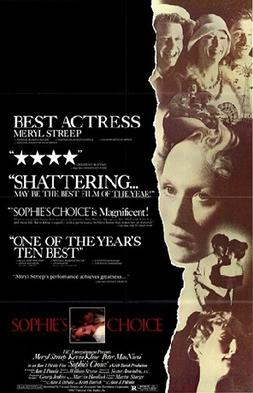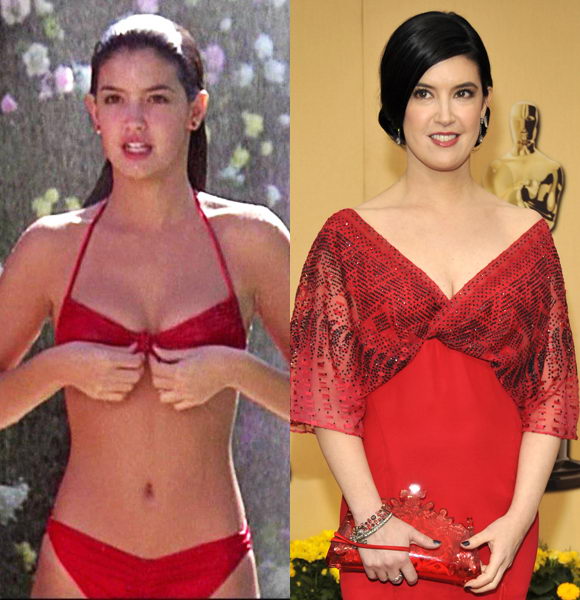Kerri Battles The AFI’s Top 100: #91 – Sophie’s Choice

I have been referencing Sophie’s Choice for jokes for years — probably more than a decade. It amuses me to no end to compare having to choose just one ice cream topping out of 100 delicious ones to Nazis forcing a mother to choose which of her 2 children will live. What can I say? I’m a sick bastard. But what’s even more amusing is that I’d been making that reference for that long and I’d never actually seen the movie. It never mattered. People always got the joke. No one ever replied to, “Wait, I can only have guac or pico on my burrito? This is worse than Sophie’s Choice!” with, “Who?” This is solid evidence to support my firmly held belief that spoiler alerts are a bullshit expectation for movies that are at least 10 years old. It’s also a good reason to actually watch the thing. If it’s so culturally pervasive that I can make a joke about it without knowing any more about it than that one single plot point, it’s probably worth finding out what else it’s hiding. When all you know going into a movie is that, at some point, some chick named Sophie gets told by Nazis that she must choose which of her children will be exterminated in a concentration camp, you sort of expect a certain thing. Sophie’s Choice was not that thing.

This. You expect this.
Sophie’s Choice is exactly like The Great Gatsby. We have our Nick Carraway — a young writer named Stingo (?? — 2 and a half hours of movie couldn’t explain what the fuck kind of name that is) who has recently relocated from Dixie to Brooklyn to pen his first great novel. Gatsby and Tom Buchanan are rolled into one character, Nathan, ostensibly a biologist at Pfizer with a paranoid mean streak. The place of Daisy is, of course, filled by Sophie, our irresistibly beautiful Polish immigrant bearing an Auschwitz tattoo on her arm. Nathan and Sophie are a fun and eccentric couple who take Stingo under their wing in a city where he knows no one. Stingo falls sort of in love with them both, at first in spite of and then because of their faults. Instead of lavish galas with live bands and flowing liquor, the three have grand days at Coney Island and theme parties for just the three of them. Of course, in the end, it all falls tragically to pieces, as it must, with our young Stingo discovering that neither Sophie nor Nathan were truly who they claimed to be. Really, the only difference is that The Great Gatsby focuses on a social circle who all seem incapable of discovering true happiness under their piles of money and puddles of gin while Sophie’s Choice tells the story of working class people trying to get through the day while coping with the truly horrific traumas they’ve experienced. Well, that and, instead of epic party scenes, there are flashbacks to concentration camps.
It wasn’t a perfect movie, but it was incredibly magnetizing and engrossing. I will also say that the things about it which I found imperfect were probably due to my own personal hang ups. For example, my issues with Peter MacNicol. It doesn’t matter how many things the man acts in or how many years pass. I’ll never be able to look at this face:

without immediately thinking of this:
followed directly by this:

and then I just feel sad and scared for the rest of the day. And, really, it’s not all Peter MacNicol’s fault. Throughout the full 180+ minutes of Sophie’s Choice, I kept half-expecting him to slip into that really creepy accent from Ghostbusters II. It would have sounded more natural to me than Stingo’s southern drawl because somewhere in my childlike mind, Peter MacNicol is Dr. Janosz Poha, forever and always.
I also have issues with Kevin Kline. First and foremost, I have a hard time reconciling my love for Kevin Kline with my objective knowledge that he made a successful career of playing a boisterous fool in everything. That holds true for Sophie’s Choice, as well. I usually just end up telling myself that, while he might not seem to have a lot of range, Kevin Kline does what he does so very fucking well. It doesn’t matter if I’ve seen it 100 times in 100 starkly different projects because he always nuances the performance in just the right way as to make it seem like the natural fit. At the end of the day, I can live with that. What I can’t live with, though, is the knowledge that his wife of 25 years, Phoebe Cates, has not aged a single day since Fast Times at Ridgemont High was released. It’s apparent that she’s discovered the real Lisle Von Rhuman (played by Isabella Rossellini in the dramatization Death Becomes Her) and has dropped out of the world of Hollywood simply because she’s afraid of anyone taking too much notice. Or, of course, she watched Death Becomes Her as a cautionary tale and realized how easy it would be for her to take a tumble, break her neck, and not die, thus revealing her cosmetic little secret to the rest of the world.

1989 vs. 2011. I’M NOT WRONG.
Still, these are really my issues, not the film’s. And they felt like minor annoyances in the face of the always impeccable THE STREEP. When I wasn’t being distracted by the above or wondering why this movie was two and a half hours long, I was wondering why I never knew that Meryl Streep was really a Polish immigrant. Her performance — the way she naturally stumbled through English, searching out just the right word and making the tiniest of mistakes — you’d think English really was her second language. Of course, we’re talking about THE STREEP here, so there was never any doubt that her performance would be flawless. The film was nominated for five Academy Awards, but only THE STREEP took home an Oscar for Best Actress because of fucking course she did. She’s Meryl God Damned Streep. The AFI should be praising every performance. They may as well publish her filmography and call it, “The AFI’s Top Meryl Streep Performances of All Time.” THE STREEP DESERVES IT. — KS

